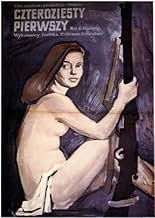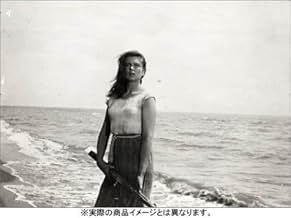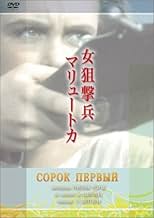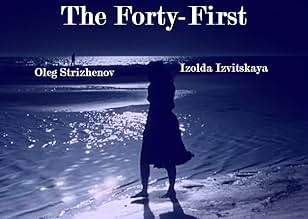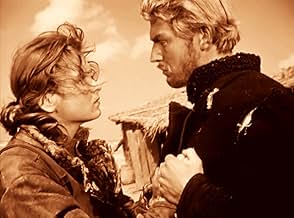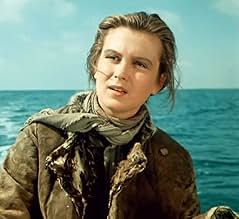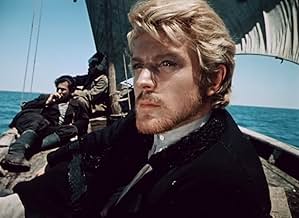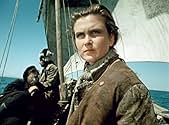NOTE IMDb
7,5/10
1,8 k
MA NOTE
Une romance inattendue survient entre une tireuse d'élite de l'Armée rouge et un officier de l'Armée blanche.Une romance inattendue survient entre une tireuse d'élite de l'Armée rouge et un officier de l'Armée blanche.Une romance inattendue survient entre une tireuse d'élite de l'Armée rouge et un officier de l'Armée blanche.
- Réalisation
- Scénario
- Casting principal
- Récompenses
- 1 victoire et 1 nomination au total
Nikolai Dupak
- Soldier Andrei Chupilko
- (as N. Dupak)
Georgi Shapovalov
- Soldier Terentyev
- (as G. Shapovalov)
Lev Kovylin
- Soldier Kovylin
- (as L. Kovylin)
Yuriy Romanov
- Soldier Vyakhir
- (as Yu. Romanov)
Daniil Netrebin
- Soldier Semyannin
- (as D. Netrebin)
Asanbek Umuraliyev
- Soldier Umankul
- (as A. Umuraliev)
Anatoli Kokorin
- Soldier Yegorov
- (as A. Kokorin)
Vadim Sinitsyn
- Wounded soldier
- (as V. Sinitsyn)
Kirey Zharkimbayev
- Timerkul
- (as K. Zharkimbayev)
Avis à la une
Watching this I was reminded of Hollywood Westerns of the mid-1950s, with the saturated color and framing of faces for psychological effect. The constant orchestral score was sometimes unnecessary and somewhat annoying; but as an interview with the director points out, the idea wasn't a grim war story, or even a political screed, but a love story, where sweeping music isn't out of place; and this is a love story.
The scenes with the nomads are striking and unforgettable; the desert sequences are also memorable, as is most of the film.
Much of the acting could be considered somewhat overwrought, with people flinging themselves down on the ground and making exaggerated gestures, so much so it almost seemed a modernized film with silent movie performances.
For those unfamiliar with the original novella, it may not matter, but the movie stays quite close to the story.
Honestly, this movie does seem dated, but is well worth the time for several scenes of honest beauty and some decent-enough acting performances. And, I have to admit, while I watched the majority of the film with more or less dispassionate interest, I was unprepared for the rifle shot at the end. It's much, MUCH more shocking than I expected, and if only for that reason, this movie sticks in my head.
The scenes with the nomads are striking and unforgettable; the desert sequences are also memorable, as is most of the film.
Much of the acting could be considered somewhat overwrought, with people flinging themselves down on the ground and making exaggerated gestures, so much so it almost seemed a modernized film with silent movie performances.
For those unfamiliar with the original novella, it may not matter, but the movie stays quite close to the story.
Honestly, this movie does seem dated, but is well worth the time for several scenes of honest beauty and some decent-enough acting performances. And, I have to admit, while I watched the majority of the film with more or less dispassionate interest, I was unprepared for the rifle shot at the end. It's much, MUCH more shocking than I expected, and if only for that reason, this movie sticks in my head.
Quite a filmmaker this Chukhrai was. Not much available from him, but I am happy to have seen two of his movies. "The Forty-first" perhaps wasn't as great as the wonderful "Ballad of a Soldier", but this is still quite an interesting film. Both of these films are war films, but contrary to what one might expect these films are told in a rather romantic, light-hearted, Hollywood style. Both films do have tragic elements which present themselves as the films progress, but they are largely rather light and enjoyable, even charming romance pictures of loved ones being torn apart and doomed by war. This story was started here with "The Forty-first" and would be perfected in "Ballad of a Soldier".
The script isn't particularly strong here, but where this film really stands out is in its visuals. An utterly stunning visual work from Chukhrai. I'm not sure I have seen a color film look like this one before! You have to see it to understand. Additionally, it's just constantly a visually dynamic film in Chukhrai's camera-movement and use of close-ups. The film is at the very least continually visually interesting and at its peak just stunning to look at. There's a really rich, dreamy atmosphere that develops by the end of the movie, and it makes for a quite unique viewing experience.
The ending is both quite outlandish but also tragic. Not too sure what to completely make of it. Then again, this was never a film which really strived for any kind of realism, so its over the top nature isn't too jarring with the rest. Actually, the more I think about it, the more I like it.
The script isn't particularly strong here, but where this film really stands out is in its visuals. An utterly stunning visual work from Chukhrai. I'm not sure I have seen a color film look like this one before! You have to see it to understand. Additionally, it's just constantly a visually dynamic film in Chukhrai's camera-movement and use of close-ups. The film is at the very least continually visually interesting and at its peak just stunning to look at. There's a really rich, dreamy atmosphere that develops by the end of the movie, and it makes for a quite unique viewing experience.
The ending is both quite outlandish but also tragic. Not too sure what to completely make of it. Then again, this was never a film which really strived for any kind of realism, so its over the top nature isn't too jarring with the rest. Actually, the more I think about it, the more I like it.
What a beautiful film. And the music score is unforgettable. I watch the film maybe 25 years ago; rewatched it today. Not only I remembered the plot, I also remembered the music. There are not many films of which I can say the same.
An outstanding piece of work, great color and lighting, straight forward story without the usual Hollywood junket attached proving again the skill of Soviet cinema making; very good ending.
9Fpi
Much can be said about the range of emotions found in today's movies. They've certainly become better at promoting a cool atmosphere, adrenaline rushes, making plots that are cleverly built up to a climax, and fitting in as many square centimetres of skin as possible into the film. Some emotions are, however, totally, and I mean totally, disregarded. Intense melancholy, an intense sense of longing and sensations of intense pity for the characters are now nowhere to be found. This movie has all of that in spades, making it radically different from today's European and American movies. It is more "theatrical" than today's more "realistic" films, but for God's sake, don't let that put you off. An incessantly beautiful soundtrack sweeps through the entire film, and the pictures are stunningly beautiful, though in a Russian way that can simply be labelled "different". This film was an eye-opener to the fact that I've seen so many movies that ultimately have left me nearly indifferent to the fate of the characters, and to some loose theory that melancholy and pity are closely related. Everyone should hunt this movie down. The ending will haunt you forever. Anything you watch afterwards will seem like ridiculous attempts to give you cheap thrills.
Le saviez-vous
- ConnexionsFeatured in Fejezetek a film történetéböl: A szovjet film 1953-1970 (1990)
Meilleurs choix
Connectez-vous pour évaluer et suivre la liste de favoris afin de recevoir des recommandations personnalisées
- How long is The Forty-First?Alimenté par Alexa
Détails
Contribuer à cette page
Suggérer une modification ou ajouter du contenu manquant

Lacune principale
By what name was Le quarante et unième (1956) officially released in India in English?
Répondre
